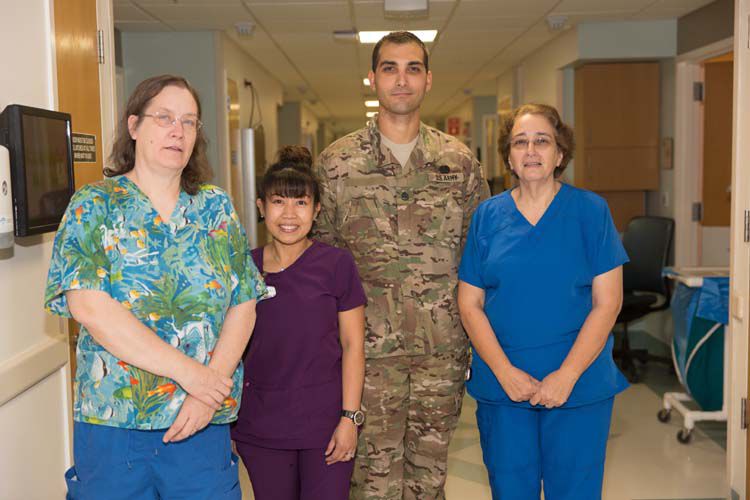
As an intermediate cardiac care nurse at the Indian River Medical Center, Don Willems deals mainly with older patients who have suffered heart attacks or are recovering from major cardiac procedures. As a sergeant in the U.S. Army reserves, it’s an entirely different ballgame.
Willems’ most recent deployment with the second battalion of the Florida National Guard’s 124th infantry regiment took him almost 8,000 miles east of the Treasure Coast to the Republic of Djibouti, (pronounced ja-booty), a small desert nation wedged between Ethiopia, Eritrea, Somalia and the Gulf of Aden on the horn of Africa.
“Djibouti,” Willems recounts, “is arid and dry. And everything is pretty much sand-colored. There are mountains and volcanic rock everywhere,” but the former French colony is also an incredibly strategic location. Sometimes called “the gateway to the Suez canal,” it is the site of the only permanent U.S. military base on the African continent and home to the Combined Joint Task Force, Horn of Africa Command.
Djibouti’s Camp Lemonnier serves as the hub for almost all U.S. aerial operations – including drone strikes – throughout the Persian Gulf region.
So, for the past 11 months, Sgt. Willems put his skills in cardio telemetry and electrocardiography aside to take care of the soldiers manning that bastion.
“I’m the platoon sergeant for the medical platoon,” Willems continues, “so I’m in charge of about 40 medics.”
“In combat,” explains the 35-year-old Willems, “you’re just trying to stabilize somebody and get them back behind the lines for better care,” but in a relatively secure place like Djibouti, he says, “you’re sort of stuck with the whole ball of wax for a while.”
That “whole ball of wax” can include ordinary illnesses and accidents and more sports injuries in a single day than the average state-side doctor might see in a week. Or even a month.
“Every time you have a group of soldiers together,” says Willems, “they’re going to find a way to play sports and they’re going to find a way to get injured. Without fail. You see so many rolled and sprained ankles that you get used to seeing them non-stop. If one does it, 10 do it.”
On his latest deployment, with almost 5,000 U.S. troops stationed in the tiny and arid nation of Djibouti, much of Willems’ time was spent treating painful – albeit not life-threatening – injuries and taking on an entirely different role, as well.
Willems and his medics also serve as teachers and de facto medical ambassadors.
For example, according to Willems, “I had some French marines come through a combat life-saver training program we put on, which is like a military first responders program. It’s a big step for unit readiness and deployment. The French came to our course [along with] Djiboutian nationals, so it was pretty interesting.”
Willems and his medics have also traveled deeper into the continent to share their skills. “I’ve gone to Uganda a couple times, training with the Ugandan military to get them ready to deploy to Somalia,” as part of an African Union peacekeeping mission there.
While the bulk of Willems’ deployments had him stationed in sand – Iraq in 2003 and 2005, Kuwait in 2009, and Djibouti in 2015 and 2016 – he was definitely smitten by what he saw in Uganda. Dubbed “the pearl of Africa” by Winston Churchill, Willems says simply, “It’s beautiful. Green, rolling mountains. Wild coffee beans growing everywhere. It’s a beautiful place.”
Still, Willems saves his most effusive praise for his wife, Josephine.
“My wife,” Willems states matter-of-factly, “is a wonderful person. She is a very patriotic sort and she is very supportive. She’s phenomenal. Honestly. Heck, she managed two kids, a full-time job and got her master’s degree while I was deployed this last time. The smartest thing I’ve ever done was to marry a woman who is smarter than me.”
With two young sons, Willems and his wife are both grateful for some non-medical technology that has worked its way into their lives. Specifically, video chat and voice call services like Skype.
“My oldest son,” Willems says almost wistfully, “was born on my third deployment but I was able to Skype and get pictures right away. Just to be able to keep in touch that way makes a world of difference.”
Making a difference is what Willems is all about and he has already set his sights on another medical mission closer to home.
He says he’d like to continue his education and become a nurse practitioner.
“I enjoy being a nurse, I really do. I didn’t think I would like it as much as I do,” but then again, when he first enlisted straight out of Westwood high school in nearby Fort Pierce, Willems’ world was a much smaller place than it is now.



